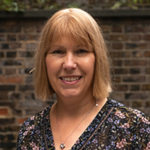It was October when I went to Blackpool. The weather was cold and damp, but the welcome was warm and generous, and the animated Blackpool illuminations, as seen from the seafront tram along the Golden Mile, were spectacular.
The purpose of my visit was to research the implementation of a project set up to help people back into employment. I would be contacting and interviewing people involved in a randomised control trial of the Individual Placement and Support (IPS) approach to supported employment in drug and alcohol services (IPS-AD).
This project was the first time that IPS in drug and alcohol services has been trialled in the UK and, as a result, further government funding has been rolled out across England so that all local councils have the opportunity to fund local services. The seven sites of IPS-AD, and the overall project research, were funded by Public Health England (which later became the Office for Health Improvement and Disparities). Teams of employment specialists were recruited and trained in the IPS model, while the process evaluation led by Rand Europe (with the support of our team from Centre for Mental Health) developed the Theory of Change and made preparations to interview stakeholders.
Why implement IPS in drug and alcohol services?
IPS has an international evidence base of achieving paid work outcomes in services designed for people with mental health problems. However, people with substance use problems are also much less likely to be employed when compared with the general population. Our research questions focused on how IPS-AD was being implemented and whether this achieved similar job outcomes. The evaluation collected learning about the challenges and successes of setting up new IPS services for a new client group.
Rand Europe and the Centre carried out 257 interviews over three timepoints with trial participants, drug and alcohol support staff, clinicians, employment specialists and commissioners. Interviewees were very enthusiastic about the new services, including some employment workers who had previously used drug and alcohol services themselves and brought this element of lived experience to the role.
Can IPS effectively support people in drug and alcohol services into sustainable employment?
The research was carried out face-to-face in each of the seven sites: Birmingham, Brighton and Hove, Derbyshire, Haringey, Sheffield, Staffordshire and Blackpool, which gave me the opportunity to see those famous seaside lights.
The findings of the research were also illuminating: we found it was often a continuous effort for IPS workers to keep the participants engaged, and stigma from prospective employers (either perceived or actual) was a major concern to IPS clients.
IPS training courses for the new employment specialists were a crucial element of preparing them for the role, and while staff do not necessarily need to have all the relevant skills and experience upon joining an IPS team, they do need to be flexible and willing to learn in order to see success.
Many of the employment clients interviewed were willing to describe their own fears and successes in answer to our questions, and these can be read in the full report. We heard many examples of IPS providing people with a sustainable way out of the difficulties of addiction, and for whom a job has brought new hope into their lives.
“Now that I’m working it boosts me up for days, because I feel like I’m worthwhile. Finally I feel like things are going right, before there was no light at the end of the tunnel, getting older, and I just thought: I need and I want to do something with my life, because otherwise if I’d carried on drinking I would have been dead, that would’ve been me gone without doubt.”
“It’s brightened my outlook, proved to me that I’m worth something. I used to think no one cares about me so why should I care.”







